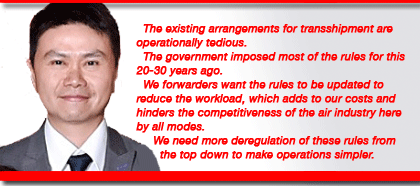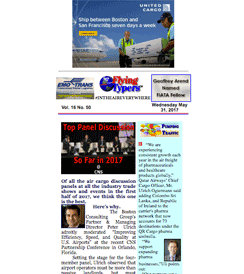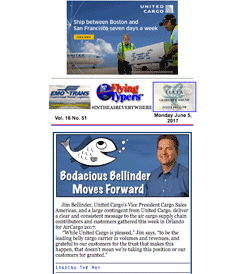Hong
Kong air freight forwarders
have a full-plate year,
but long-term competitiveness
will depend on infrastructure
investment at HKIA and
supportive government
policies.
Those thoughts were among
the key points made by
Brian Wu, the affable
and insightful chairman
of the Hong Kong Association
of Freight Forwarding
and Logistics, the non-profit
organization which represents
the autonomous territory
at FIATA as well as pushing
forwarder interests closer
to home.
Years
Two Wu
Wu, elected chairman for
two years in April, was
previously vice chairman
of Haffa and has served
on the organization’s
executive committee since
2009.
His first steps in his
new role have been to
push Hong Kong’s
administrators for more
support.

Wu
Would Like
First and foremost, Mr.
Wu would like further
deregulation of policies
governing transshipment
of cargo at HKIA arriving
by land, sea, or air,
mostly from mainland China.
At present, he said licensing
for particular products
such as telecommunication
products was bureaucratically
time-consuming for forwarders.
Mr. Wu would also like
to see air-air transshipment
rules extended to air-sea
and air-land movements
via HKIA, and he thinks
arrangements at Singapore’s
Changi Airport Free Trade
Zone can be used as a
performance benchmark
for through and non-through
airside transshipment
cargoes.
Wu
Rejects Tedium
For example, Mr. Wu said
administrators should
allow value-added services
such as reassembling,
repackaging, and sorting
and packing to be performed
on transshipment goods
at HKIA before the goods
are further shipped to
final destinations.
“The existing arrangements
for transshipment are
operationally tedious,”
he said.
“Hong Kong is a
small city with very few
factories and most of
the products are made
in China and transshipped
through Hong Kong for
export overseas.
“The government
imposed most of the rules
for this 20-30 years ago.
“We forwarders want
the rules to be updated
to reduce the workload,
which adds to our costs
and hinders the competitiveness
of the air industry here
by all modes.
“We need more deregulation
of these rules from the
top down to make operations
simpler.”
Forwarders
Have A Voice
He also said stakeholders
would like more input
into the government’s
strategic decisions:
“The Hong Kong government
encourages industry to
do more business with
high value cargo such
as frozen food, but they
need to listen to us,”
he explained.
“We need to set
up suitable facilities
and we need more land
for this and these cargoes,
otherwise customers will
do this business in Mainland
China.”
Bridging
The Future
“We are very glad
infrastructure is being
upgraded, especially the
bridge to Macao, which
is due for completion
soon, and the third runway
at HKIA, which we hope
opens in 2023, although
this might be optimistic.
“Once open, the
new runway will give us
more timeslots for landings
and increase frequencies.
“And more capacity
will help us better serve
customers. But we would
like more input on infrastructure
decisions in future.”
WU
On The Stakes
Mr. Brian Wu also issued
a stark warning about
what could happen if Hong
Kong does not keep supporting
its air freight stakeholders.
“Hong Kong’s
port was number one in
the world; now it is ranked
number 5 behind Shanghai,
Singapore, Shenzhen, and
Ningbo-Zhoushan.
“But we are number
one for air freight and
we want to stay there.
Airports in Mainland China
are catching up a lot
and we need the infrastructure
to support us.”
Business
Is Rising
As reported in FlyingTypers,
throughput at HKIA surged
17.8 percent year-on-year
in March to 433,000 tons,
while in the first quarter
volumes were 11.5 percent
higher than a year earlier
at 1.1 million tons.
Wu said the market had
been unexpectedly positive
since September 2016,
while the first quarter
of this year was much
better than a year earlier
when the market was largely
stagnant.
“It’s hard
to anticipate the future,”
he explained.
“We didn’t
know Q4 of 2016 would
be as good as it was and
it accelerated so quickly
from September that airlines
and terminals ran short
of equipment such as ULDs,
although they did a great
job of handling a very
unexpected market pick-up.
It carried on being busy
right up to Chinese New
Year. It was then quiet
in February and bounced
back in March.
“Now we are very
optimistic for 2017 and
there are lots of big
product launches later
in the year, such as the
new iPhone, which the
big multinationals are
already shipping. Chinese
companies such as Xiaomi
and Oppo also have launches
and these will boost demand
to Asia and especially
India, which has been
hot for second tier mobile
phone producers for some
time.
“A lot depends on
how sales go and whether
inventories need replenishing.”
Middle
Class Expands Market
Wu said Asian demand growth
had outstripped Europe
and the U.S. in percentage
terms over the last year.
“Asia and particularly
India are the rising stars
of the future,”
he added.
Asia is also importing
a lot more cargo by air.
“We are seeing a
lot of import shipments,
but those are not limited
to IT products,”
he explained.
“The Chinese population
is buying a lot of foodstuffs
and wine from Europe and
the U.S.
“The middle class
is rising in China and
want to enjoy life and
are buying luxury items
from overseas.
“Also, e-commerce
has also been booming
for the last 3 years.
“The Chinese government
is encouraging more trading
and imports to Mainland
China to facilitate demand
from the population, and
this will continue in
future.
“This is giving
more balance to the market,
which is traditionally
export led. I don’t
know how long it will
last, but the air market
is hot so we are very
positive for 2017 and
ahead,” Mr. Brain
Wu declared.
SkyKing





